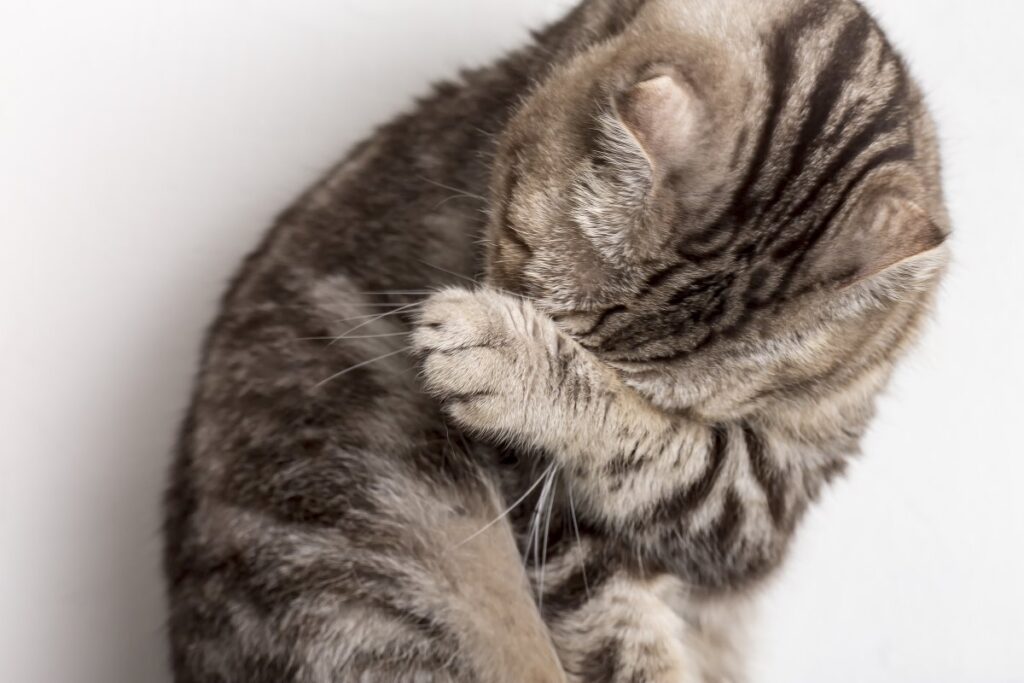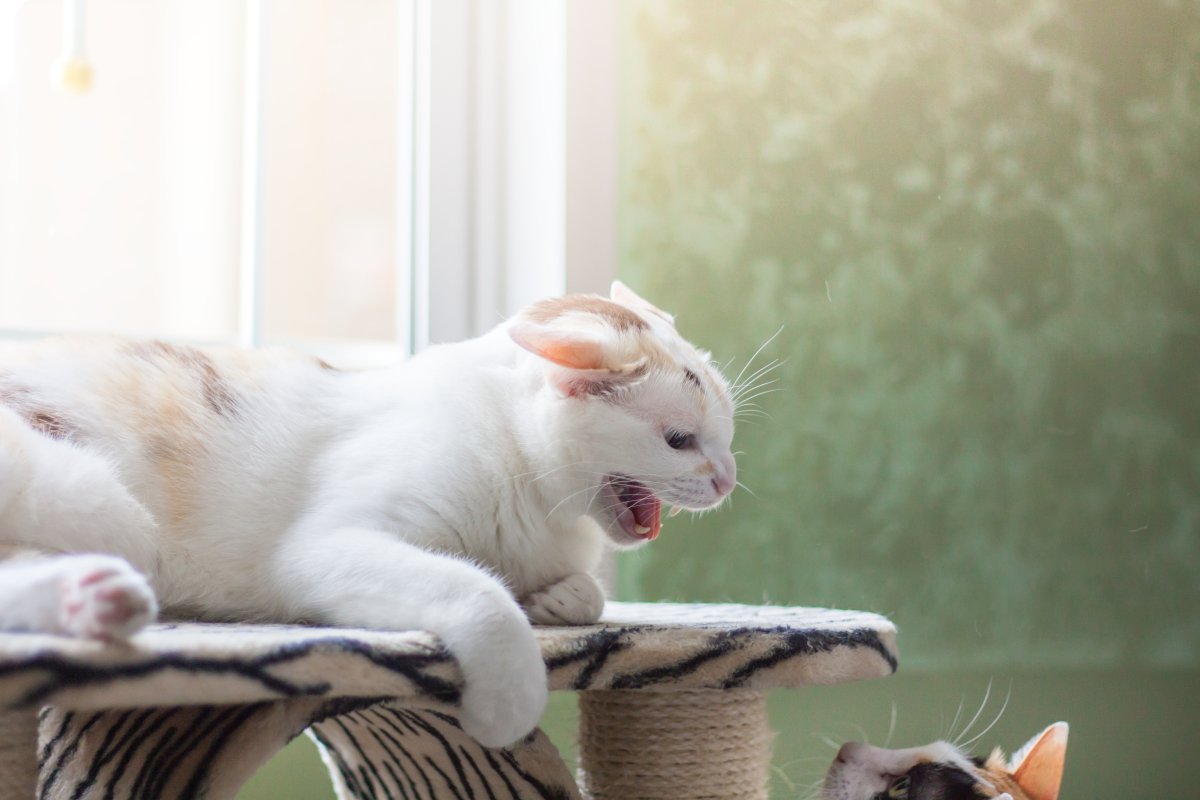Have you ever felt that your cat is stressed out? Do you feel she is dull even when you’re around her? What to do if my cat is bored? Maybe these questions are currently in your mind. Stay tuned, as we’ve gathered a few tips for reducing the boredom and stress in cats.
No matter how hard we try to keep the environment friendly and enjoyable for our pets, in some cases, most of our pet cats are exposed to different forms of stress.
Just like normal people, how well our feline companions handle stress depends on their innate deposition and their nature of being stressed.
So, if you often find your cat not playing and interacting well, she might be stressed or bored!
If you are worried about her unusual behavior, look at our guide on spotting signs, causes, and helpful tips to relieve stress and boredom in your cat.

Why Do Cats Go Under Stress?
Our feline friends are subtle animals; it can be tricky for cat parents to know if their cats are stressed or not. You might notice a slight change in her behavior, or she may start doing things that you perceive as naughty. Domestic cats are great at hiding signs of pain and illness; it is simply their nature. While the wild cats avoid stress by targeting predators.
When your cat has started scratching the furniture piece as she didn’t before, or spending most of her time hiding in cupboards even if she was confident previously, these may indicate the signs of stress and something is bothering your little cat.
While talking about the emotional perspective, cats also feel frustrated, anxious, and even depressed. They also respond emotionally to pain, such as being tired or stressed. Moreover, boredom can also cause stress in cats. However, before going into depth, it is essential to understand the cat’s underlying emotions, so let’s learn about the signs and causes of stress in cats:
Signs of Stress in Cats
So, your cat’s behavior has suddenly changed. Some signs of your cat’s stress can be very obvious, while others are harder to spot. Your cat may also eat less than normal.
Have a look at the following indications that can possibly stress symptoms:
- Hiding away all the time
- Avoid certain places, people, and other pets
- Poor coat quality
- Your cat’s body language shows that she is worried, for example crouching or arching, slinking low or ears back, etc.
- She has low energy
- Excessive grooming, hair loss, or skin problems
- Blood in the urine, peeing out of the litter box or in the wrong place, urine marking or spraying.
- Meowing or yowling more than usual.
- Weight loss
- Vomiting or diarrhea
- Sudden changes in behavior, from active playing to not wanting to play anymore.
- Showing aggression towards other people or pets.
Causes of Cat Stress
There are many potential reasons for cat stress, and the following are some of the most significant triggers:
- Change in your cat’s daily routine
- Environmental changes include introducing new members to the house or changes in the physical environment.
- Your poor relationship with your cats includes inappropriate socialization, punishment, or little handling.
- Lack of environment stimulates opportunities for normal feline behavior such as scratching, hunting, or territorial communication.
- Conflicts between cats due to the new cat’s arrival in the home.

Tips To Relieve Cat Stress and Boredom
If you want to ensure your cat doesn’t get stressed or want to relieve her boredom, the following are the tips you can follow to make her happy:
- First and the most, to prevent stress from your cat, make sure she has everything to be happy such as enough bedding, constant access to water, litter trays, or scratching posts. Keep the water and food from one another; similarly, litter boxes should also be kept away from both bowls.
- If you have more than one cat, make sure to have separate food and water items for each cat in the household. These should also be kept in different locations or fed to both cats at different times.
- Provide your cat lots of hiding places where she could feel safe such as cardboard boxes, igloo beds, or high comfy places to rest.
- If your cat enjoys the outdoors, try getting a cat flap so she may come and go whenever she wants.
- Cats love their daily routine, and they feel distressed when their owners change their mealtime. Your cat is a habitat; therefore, try to keep the same schedule as much as possible with the same meal time every day.
- Don’t clean all the beds and blankets of your cat at once. Try rotating them so that your cat always has something that smells familiar.
- Like humans, not being active releases stress and boredom; the same case goes for our cats. Give your cat plenty of time to play, and provide her with toys to help her to avoid boredom. You can bring your cat puzzle feeders or scatter dry food. Hide your cat’s favorite treat; this is a great way to keep her active as she will put her energy into finding those treats.
- Give your cat some space, don’t run after her. Cats like their privacy and don’t like when someone tries to interrupt it. Let them choose when they need your attention. Sometimes our sensitive creature gets stressed over too much attention.
- Make sure all of your family members know your cat’s stress. This is most important for kids as they can’t understand your cat’s behaviors. It would be best to supervise children with the cat to make sure your cat stays calm and relaxed and has fun at the same time.
- When bringing new things, give your cat time to adjust. If your cat is stressed by change, think about whether the changes are essential and in your cat’s best interests.
- Use a cat pheromone diffuser if you anticipate something that you know would stress your cat but is unavoidable, such as welcoming a new member or moving house.
Wrapping Up
After reading the above articles, we hope you know how to relieve cats’ stress and boredom.
If your cat constantly shows signs of stress and boredom despite applying all the above tips. It is advised to take your cat to the vet because she might be suffering from some underlying health conditions that only your vet can address appropriately.







